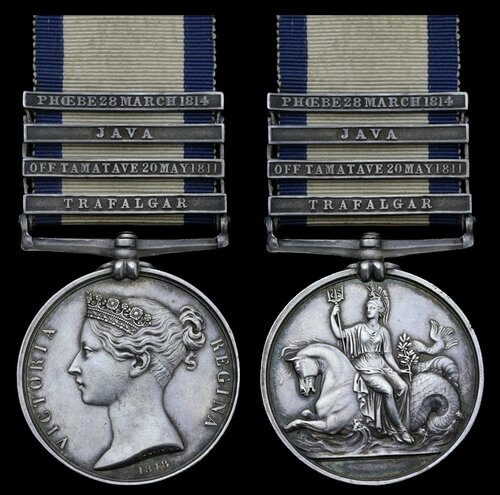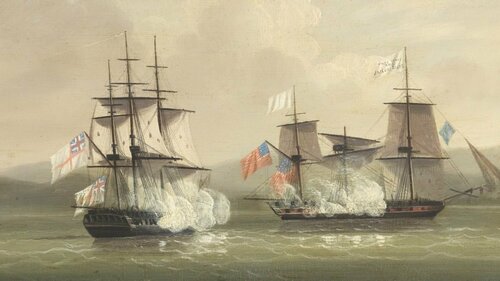Auction: 22001 - Orders, Decorations and Medals
Lot: 435
(x) Naval General Service 1793-1840, 4 clasps, Trafalgar, Off Tamatave 20 May 1811, Java, Phoebe 28 March 1814 (James Robinson.), naming engraved in an attractive, contemporary style, extremely fine
James Robinson served as an Able Seaman aboard the 36-gun frigate H.M.S. Phoebe, the Medal Roll noting entitlement to all four clasps but that two, three and four were an 'Additional Claim'.
The Phoebe saw extensive service in every theatre of operations during the French Revolutionary and Napoleonic Wars, including the Mediterranean, Baltic, Indian Ocean, Asia, and the Americas; at Trafalgar (21 October 1805) she was first in the line of Nelson's scouting frigates, and had the further distinction of being the first to sight and report on the Franco-Spanish fleet's putting to sea from Cadiz which led to that epic engagement.
At the Battle of Tamatave (20 May 1811), light winds hampered a decisive frigate battle, but Phoebe was in the thick of the action and suffered casualties of 31 killed and wounded, at one point being sandwiched between the concentrated fire of the French ships Nereide and Clorinde. Nevertheless, Phoebe's destructive broadsides killed the captain of the former ship, and the battle ended in a British victory. On 3 August 1811, she joined the British fleet involved in the invasion of Java; her captain (Sir James Hillyar) landing with a party of seamen, marines and sepoy soldiers to take possession of the port, fort and public stores of Taggal on 11 September that year.
Showdown off Valparaiso
Reading like the pages of Patrick O'Brian's famous 'Aubrey-Maturin' novels, on 28 March 1814 a fierce engagement was fought just off Valparaiso between the Phoebe and the 36-gun U.S.S. Essex, commanded by Captain David Porter. In a duel between these outwardly equal ships, the long guns of the Phoebe played havoc with the Essex's rigging outside of the short range of her main battery of carronades; Captain Hillyar skilfully using this to his advantage rather than engaging yardarm-to-yardarm which had previously seen so many British vessels falling to their American foes. In an action that lasted nearly four hours, by 6.20pm that day it was obvious that the British had prevailed and Porter struck his colours. In an unusual incident, it actually took Hillyar ten minutes to realise Porter had surrendered, the many morale-boosting banners and flags hoisted on the Essex (including those which read: 'Free Trade and Sailors Rights' and 'God Our Country and Liberty. Tyrants Offend Them') obscuring the lowered American ensign.
The 'Butcher's Bill' bears testament to the one-sided affair: a mere 11 British casualties aboard the Phoebe but 214 Americans were killed and wounded. Hillyar, aboard Phoebe and with his prize in tow, returned to Britain and the Essex was purchased into the Royal Navy.
Subject to 5% tax on Hammer Price in addition to 20% VAT on Buyer’s Premium.
Sold for
£3,500
Starting price
£700







